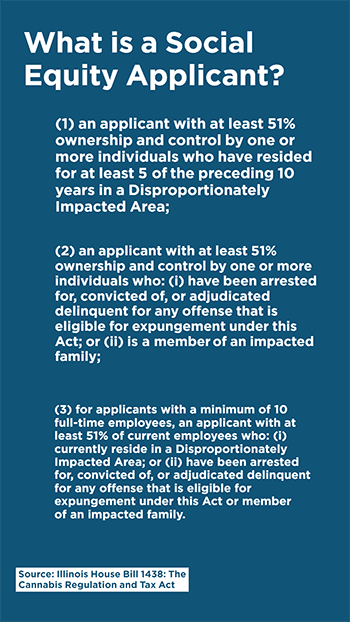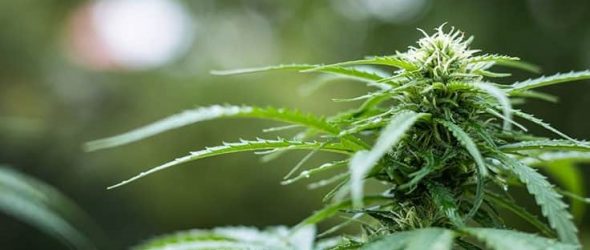With Illinois poised to begin adult-use cannabis sales Jan. 1, 2020, some of Chicago’s aldermen and public stakeholders are concerned that a program designed to improve social equity access for minority business owners won’t live up to its promise.
A photo depicting a room full of white men participating in the city’s dispensary-license lottery on Nov. 15 went viral, eliciting responses from those who are upset that, when the program begins, there won’t be equity in ownership for black or Latino residents—or other prospective entrepreneurs based in areas of the city disproportionately affected by prohibition-era cannabis arrests.
The owners of Chicago’s 11 medical dispensaries are all white, and theirs are the only businesses that are either licensed or allowed to apply for licenses to add adult-use sales on Jan. 1. They participated in the lottery for the chance to acquire licenses for secondary locations, and other existing medical dispensaries in surrounding areas were the remaining lottery participants vying for the chance to add stores in the city.
Because there are none of Illinois’ medical cannabis business owners are black, according to the Chicago Sun-Times, and the approaching adult-use market will be based off of the state’s medical cannabis industry, the first adult-use dispensary owners in Chicago won’t be reflective of that city’s population, says Jason Ervin, 28th Ward alderman and chairman of City Council’s 20-member Black Caucus.
That’s a problem, Ervin says, as African Americans have been disproportionately impacted by arrest and incarceration due to cannabis offenses and should be able to fully participate in the industry once it is legitimized.
“We’re going to buy today, we’re in jail today, so why can’t we have equity today?” he asks.
Ervin and the Black Caucus introduced an ordinance in October that would delay the sale of adult-use cannabis in the city until July 1, 2020, to try to get more minority ownership in the space.
“I think that to have all of this activity in the state of Illinois and to walk out to no participation, for many communities of color, I just think that’s wrong,” Ervin says. “And I think we need to work to fix it.”
The reason the room in that viral photo looked the way it did is because Illinois is distancing itself from other states in its approach to cannabis legalization. It’s issuing adult-use licenses in phases—first making them available to established medical cannabis businesses who have capital and experience adhering to regulations in the space. Then the state will open the field to others, including social equity applicants, says Toi Hutchinson, senior adviser to the governor on cannabis control.
This is an attempt at achieving social equity both in the industry and in the communities that have been hurt the most by prohibition, says Hutchinson, who played a large role in drafting Illinois’ Cannabis Regulation and Tax Act as a state senator.
In drafting the bill, the state made some concessions to the existing medical market, State Sen. Kimberly Lightford told the Chicago Sun-Times earlier this year.
David Moore, Ward 17 alderman, says he doesn’t think medical dispensaries should have been given priority in the adult-use program rollout, but he understands the state had to do what was necessary to pass the bill. Looking at the lack of current equity ownership in his city, he says, “I think right now, we need to slow the train on this in Chicago.”
Illinois designed its program to be race-neutral so that it can hold up in court, Hutchinson says. But it addresses social equity in areas where people have been the most disproportionately impacted by the war on drugs, and where many black and Latino residents live. To that end, the state created a “Disproportionately Impacted Areas” map that plays a role in determining who can be a social equity applicant.
“I think it’s important to note that you can’t go back and change the past, but you can take very aggressive steps to make sure that the future looks differently.”
– Jason Erkes, chief communications officer at Cresco Labs
“What we know about that population is that it’s 55% African American and 22% Latino that have been disproportionately impacted,” Hutchinson says. “We know that. So, we designed an application, we designed a process, we designed a system that would try to get some of those folks the ability to come into this thing.”
Illinois’ “Disproportionately Impacted Areas” shows that Chicago neighborhoods hit hardest by prohibition are on the city’s south and west sides.
People who don’t already operate medical dispensaries can apply through Jan. 1 for a conditional license to sell adult-use cannabis. Forty-seven of these conditional licenses will be available to be awarded to dispensaries in the Bureau of Labor Statistics Region of Chicago-Naperville, Elgin, according to the Illinois Department of Financial and Professional Regulation (IDFPR).
The state will select licenses based on a point system. Within that system, “Status as a Social Equity Applicant” alone can earn an applicant 50 points out of a total of 250, or 20%.

Illinois will put initial operators’ licensing fees into a $30-million fund that will go toward a revolving loan program for social equity applicants, Hutchinson says. “The other thing is that people typically only talk about this for dispensaries and cultivation centers,” she adds. “We added multiple more on-ramps, so the craft grower licenses, the infuser licenses, the transporter licenses.”
In Chicago, dispensaries will at first be limited to seven storefronts in each of seven different zones. Between the 11 existing medical dispensaries and 31 lottery slots already issued, the city could hand out up to 42 adult-use licenses. Then, around May 1, the state will start issuing up to 47 conditional licenses to Chicago-Naperville, Elgin. Also on May 1, Chicago may double the number of dispensaries allowed in each of its seven zones.
Cresco Labs currently operates five medical dispensaries in Illinois, including one in Chicago. That Chicago dispensary, MedMar, in the Lakeview neighborhood, will add adult-use sales on Jan. 1. Also, pending approval, Cresco will add three more dispensaries that it drew for in the Nov. 15 lottery.
Jason Erkes, chief communications officer at Cresco, says the state’s bill “is the most thoughtful piece of legislation that’s ever been crafted for adult-use cannabis.”
The bill, Erkes points out, states that the existing medical dispensaries must follow a “Social Equity Inclusion Plan.” One of these several specific plans outlined by the state is that dispensaries can host an incubator program that, according to the bill, says each participating dispensary would “provide a loan of at least $100,000” and mentor a social equity applicant for at least one year.
Cresco recently launched its own program in Illinois called Social Equity & Educational Development (SEED), which, according to a press release from the company, is “the cannabis industry’s first national social equity initiative promoting inclusion, expungement, equality, access and community engagement.” The company is incubating 150 people in roughly 35 groups on how to apply with the state for a dispensary license, Erkes says, adding that Cresco provides them coaching and pro bono legal counsel.
“I think it’s important to note that you can’t go back and change the past, but you can take very aggressive steps to make sure that the future looks differently,” Erkes says. “And that’s what this legislation does, and that’s what all the companies that are currently in this industry are committed to doing.”
“Now, if someone can show me a model for how you do it and get exactly what they’re asking us to do, show it, because it doesn’t exist.”
– Toi Hutchinson, senior adviser to the governor on cannabis control
Moore calls Chicago Illinois’ “cash cow” for the adult-use cannabis industry. “People want to be in Chicago, so if we do what we need to do to hold this up, everybody will come to the table, and there’s space where they can work and do some compromise,” he says. “And they know that they can. Right now, today, they’re getting away like a fat rat in a cheese factory at this point. And we have to, again, just slow this train down until there’s more equity that’s representative of this city.”
Other states allowed everyone to come into their adult-use programs right away, Hutchinson says. This, she adds, has resulted in one dispensary for every 6,000 people in Oregon, one for every 10,000 in Colorado, one for every 37,000 in Washington and one for every 47,000 in Colorado.
In contrast, she says, Chicago will open with one dispensary for every 424,000 residents, and if it gives out 100 licenses by early 2020, it will still only have one for every 127,000 people. This is how the state can protect market share for social equity applicants, she says, adding that it’s too early to critique inequity on day one of legalization.
“Every other state opened the doors wide open—like wide open—and then tried to backdoor equity at the city or county level,” Hutchinson says. “And what we’ve seen—it does not work. So, we have to do this differently. Now, if someone can show me a model for how you do it and get exactly what they’re asking us to do, show it, because it doesn’t exist.”
In a Dec. 4 hearing held by Chicago City Council’s Committee on Contracting Oversight and Equity, Ervin continued to speak out about a lack of current equity. With cannabis industry members present, the room had mixed opinions about the Black Caucus’ proposed delay of sales. “Of course, they want to move as expeditiously as possible,” Ervin says. “But at the same time, we want to ensure that the equity is at the forefront of all of these conversations.”


